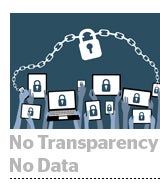 In the wake of Apple CEO Tim Cook’s fighting words about data collection and a major study finding consumer sentiment toward online tracking is at an exasperated tipping point, it seems clear that privacy is having another “moment.” What’s an industry to do?
In the wake of Apple CEO Tim Cook’s fighting words about data collection and a major study finding consumer sentiment toward online tracking is at an exasperated tipping point, it seems clear that privacy is having another “moment.” What’s an industry to do?
Sources approached by AdExchanger sound a familiar chorus: Advertisers should increase operational transparency or face consumer backlash. But it’s easier said than done.
Rob Griffin, EVP of media futures and innovation for Havas Media Group, called consumer sentiment on data mining a “growing concern … that will continue to grow as consumers get educated and understand the implication.”
The implication, of course, is that tech firms build businesses off the consumer data they collect.
“Most consumers are fine as long as they get something in return, whether it be better content or special offers,” Griffin said, “The industry overall needs to make sure they balance this trade off in order to avoid backlash.”
The nature of that balance, however, is unclear, according to research from the Annenberg School for Communication at the University of Pennsylvania released shortly after Cook’s speech. The study found consumers disagree with the practice of data mining in exchange for services, but feel helpless to change current practices.
Eighty-four percent of respondents to Penn’s study said they’d like more control over what marketers can learn about them, but 65% of those consumers believe they have little control over how their data is collected and leveraged.
More than 90% of respondents disagreed that it was fair for companies to collect information about them without their knowledge in exchange for a discount, and a majority (55%) said it’s not OK for stores where they shop to use information about them to improve the services they’re offered.
“Americans don’t think the trade-off of their data for personalized services is a fair deal,” said Omer Tene, VP of research for the International Association of Privacy Professionals and author of “A Theory of Creepy,” an academic paper on digital privacy published last year.
“We’ve been operating under the assumption for several years that consumers don’t have a good understanding of data flows, uses of data and the trade-offs that underlie the digital economy,” he added.
Playing By The Rules
The way the industry is structured offers little choice to consumers. Though consumers are offered opt-outs for data mining in certain instances, there are gray areas for data collection and some appear to be more nefarious than others. (Consider Uber’s privacy policy change that lets its app mine user data in the background.)
But firms like Apple, big data marketing services providers like Acxiom, Experian Marketing Services and Epsilon and small data mining firms alike feel they’re playing by the rules.
“They’re operating in the environment that they’ve been given,” said Chris Calabrese, VP of policy at the Center for Democracy and Technology. “In the United States, you’re allowed to freely buy and sell personal information.”
Good business practice means providing consumers the means to opt out. Yet, consumers often don’t, either because they don’t know how or don’t even know it’s an option.
In 2010, the Digital Advertising Alliance launched the AdChoices icon, designed to give consumers greater visibility into when they were encountering targeted ads. But Parks Associates research found that the AdChoices icon was only recognizable by 6% of survey participants in 2013, up from 5% in 2011.
And in a March poll of US Internet users conducted by ORC International for Kelly Scott Madison, nearly three-quarters of respondents were not familiar with the AdChoices campaign.
Since that time, Calabrese recognizes incremental progress in helping consumers self-regulate how their data is shared. Acxiom, for example, has opened up a small fraction of the information in its databases, though the Penn study suggested that’s not enough to appease consumer discontent.
According to Tony Hadley, SVP of government and regulatory affairs for Experian Marketing Services, consumers should take steps to educate themselves on current practices.
“Educational resources and tools for consumers to make informed choices about their data do exist,” Hadley said. “There are also best practices, frameworks and existing laws for responsible data management, analytics and privacy.”
Ultimately, data marketing services providers believe consumers have a responsibility to know what the rules are. But assuming every business that traffics consumer data plays by the rules, “the fact is the rules are not as strong as we think they should be,” said Calabrese.
What’s At Stake
Data marketers bristle at the thought of strengthening federal regulation around use of consumer data.
But it’s the potential consumer backlash – regardless of regulation – that could put the digital advertising ecosystem at risk, according to Fatemeh Khatibloo, principal analyst at Forrester.
“This is less about satisfaction and more about trustworthiness,” she said. “If consumers think their data is being misused, or that it’s being sold without their knowledge, they will take action. And there are plenty of privacy tools out there to help them.”
Ad blocking doesn’t effect consumer data sharing, but it’s a symptom of consumer discontent. (Calabrese was hesitant to link ad-blocker adoption directly to negative consumer sentiment on data mining.) According to a recent report from media analyst Frederic Filloux, between 15% and 17% of Americans use ad blockers.
“Ad blocker adoption is holding pretty steady in our research – about a quarter of US adults use them,” said Khatibloo. And consumers are reacting with other tools. “The use of Do Not Track plugins and cookie trackers like Ghostery are definitely increasing.”
Tech firms and brands are also gambling with their reputations, said the International Association of Privacy Professionals’ Tene.
So what can advertisers do? Khatibloo advocates for what she calls “contextual privacy,” where the personal data collected and used balances business needs with customers’ expectations.
“It’s a gentlemen’s agreement of sorts that we will provide tangible value, and that we’ll be transparent and provide meaningful choice before we collect a ton of customer data,” she explained.
Greater transparency and stricter policy regulation may also be in order, according to Calabrese, though the industry isn’t in favor of legislation.
“Consumers are going to need to know that they have some rights under law if they’re going to have confidence that they have some control over where their information is going,” Calabrese said. “Studies like this show why it’s important that we get some baseline rules because we’re going to continue to have nagging consumer concerns. I expect it will only get worse as more data is collected if we don’t have any legal protection.”
If customers increasingly use identity obfuscation or anonymous browsing tools, it might be too late for the ad tech ecosystem to recover, added Khatibloo.
“If I were an advertiser today,” she cautioned, “I’d be very measured with my mobile advertising practices, because this is the channel that consumers will be most keen to disintermediate if it’s done poorly.”













